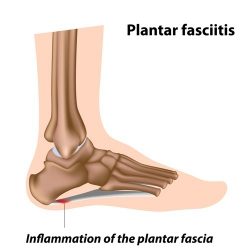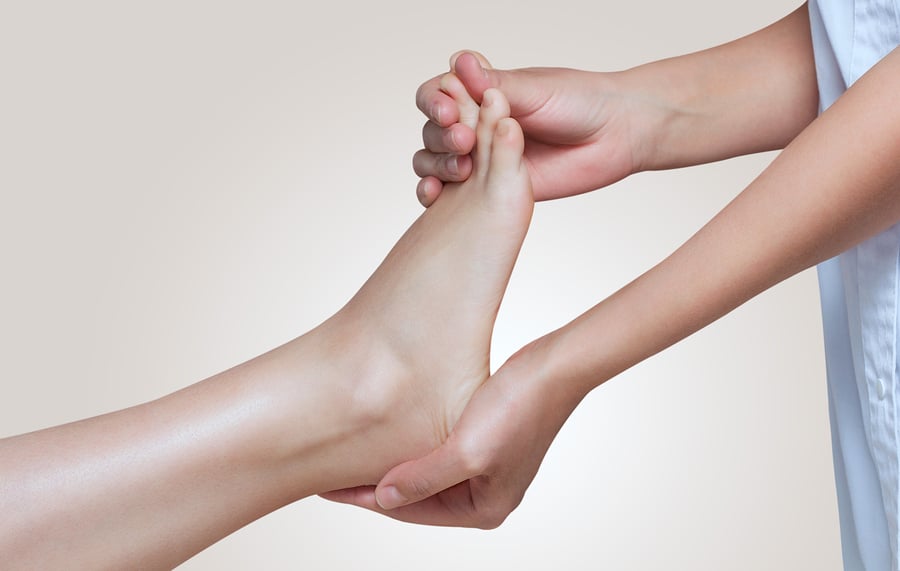Are you suffering from heel pain?
Plantar fasciitis - the low down
If you’ve ever had heel pain you’ll understand how intense the pain can be. Plantar fasciitis is generally the cause and accounts for around four out of five cases. The pain, which can be in one or both heels, tends to accumulate slowly and gets worse over time.
Heel pain is usually as a result of the plantar fascia – the tissue that runs from the heel to the ball of the foot – becoming thickened and inflamed. Generally worse in the morning as you take your first steps out of bed or after a period of sitting. The pain improves on walking but often worsens again after a few minutes or after standing.
What causes plantar fasciitis?
Heel pain caused by plantar fasciitis usually affects those aged between 40 and 60 who spend a lot of time on their feet or those who run or jog regularly on hard or uneven surfaces.

The plantar fascia is a strong band of tissue that stretches from your heel and fans out along the under surface of your feet to the toes. It supports the arch of your foot by pulling the heel bone forwards as the Achilles tendon pulls it back to maintain the arch of your foot. The plantar fascia also acts as a shock absorber supporting the equivalent of 20 times our body weight.
Repetitive small injuries (micro trauma) to the fascia are believed to lead to the thickening of the plantar fascia which results in heel pain. This can occur over many months or years and the surrounding tissue and heel bone sometimes become inflamed too. Plantar fasciitis usually affects more women than men and the outcome is generally good with approximately 80% of people having no pain within one year.
If your heel pain persists for more than 3 weeks then it is advised to see a healthcare professional such as a physiotherapist or podiatrist or make an appointment with your GP as although plantar fasciitis is the most common cause of heel pain there may be other reasons such as:
- Inflexible calf muscles and tight Achilles tendon
- High arches or rigid feet
- Arthritis in the ankle or heel
- Nerve irritation around the heel
- A weakness or thinning or an injury to the heel pad
How to prevent plantar fasciitis?
Early treatment is recommended to prevent heel pain deteriorating or reoccurring but there are ways to prevent it in the first place. These include:
- Wearing supportive and cushioned shoes
- Using a pad or insole to cushion the heel and support the arch (the aim is to raise the heel by about 1 cm)
- Stretching your calf muscles regularly
- Trying to minimise time spent standing on hard surfaces.
Treatment for plantar fasciitis
In most cases these simple steps will help to reduce the pain and aid your recovery:
- Wear shoes with effective support and cushioning which have a slightly raised heel
- Avoid excessive running, walking or standing especially on hard ground
- Keep the ankle and foot moving but avoid overstretching
- Rest regularly
- Ice packs and/or deep heat therapy may help
- Self-massage
- Orthotic supports
- Reduce your weight if necessary
- Taping the foot
- Steroid injections
Occasionally, in particular, chronic cases you may be offered:
- Surgery – where the plantar fascia is cut to reduce the stress on the heel. You will need to wear specialised heel cushions after surgery and it can take up to 6 weeks to recover.
- EST (extracorporeal shockwave therapy) – soundwaves are beamed onto the foot which causes microscopic damage to the affected area and so stimulates healing.
Our Health at Hand nurses advise that the most effective long term solution to plantar fasciitis is the correction of foot posture by using insole supports, and a regime of foot stretching and strengthening. Please see your healthcare professional for tailored advice on which supports and stretches are best for you.
You can find out more about wearing high heels everyday here and further information from the NHS on Heel Pain.
Disclaimer
All content on Silversurfers.com is provided for general information only, and should not be treated at all as a substitute for the medical advice of your own doctor or any other health care professional. Silversurfers will not be responsible or liable for any diagnosis made by a user based on the content on www.silversurfers.com and we are also not liable for the content of any external websites or links from or to Silversurfers to any other websites. Please always consult your own doctor if you’re in any way concerned about any aspect of your health
Melina - Assistant Editor
Latest posts by Melina - Assistant Editor (see all)
- Cream Cheese Orange Bars - May 2, 2024
- Top tips for hay fever sufferers - April 14, 2024
- Paysan Breton Cream Cheese Breakfast Wraps - April 12, 2024
- 4 Homemade Sweet Treats for Easter - March 24, 2024
- Playground Memories - March 10, 2024





















